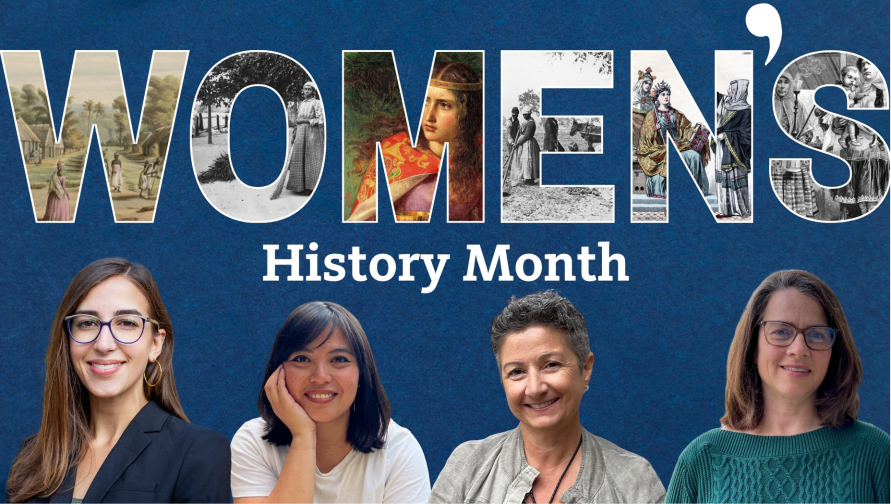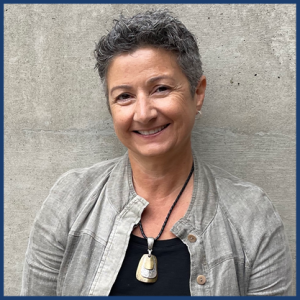
By Nikki Babri
For Women’s History Month, the School of Humanities turns to its esteemed women historians to highlight the importance of studying women's history in addressing today's pressing issues. The 2024 National Women’s History Month theme, "Women Who Advocate for Equity, Diversity and Inclusion," honors the women dedicated to eradicating bias and discrimination from our society and institutions, paving the way for a more equitable future.
Within UCI's Department of History, distinguished women scholars play a pivotal role in advancing this mission. Through their groundbreaking research and dedication to diversity, they not only enrich the field but also inspire students through their innovative classes.
Black women in the Civil War
Assistant Professor of History Samantha Q. de Vera’s research focuses on the experiences of enslaved and formerly enslaved Black women during and after the American Civil War. In her current project, de Vera explores the challenges faced by Black women in border states, where the Emancipation Proclamation did not apply, as they sought to reunite with their families.

“During the Civil War, Black mothers often went to Union officials to assert their rights as mothers and their children’s entitlement to safety. These historical demands resonate now as much as they did then,” she explains. “Today, mothers condemn the killing of their children by police and the U.S. war machine, which operates all over the globe, supporting oppressive and violent regimes.”
She is currently developing the course, "Women and U.S. Wars," where she invites students to explore the intersections of gender, race and political ideologies throughout American history. By examining the experiences of Native American women, women in the Revolutionary War, the War of 1812 and the Civil War, de Vera unearths the often-overlooked contributions of women to wartime efforts and the broader political landscape.
De Vera's latest research highlights the resilience and agency of Black women, particularly young girls who traversed the war-torn South in search of their siblings. For de Vera, studying the history of Black women and girls is crucial to understanding modern racism and sexism in the United States. “Centuries of slavery and commodifying Black women’s reproduction has led us to a moment where all women in the U.S. must fight for bodily autonomy and reproductive rights while many countries in the Global South – once so restrictive with women’s reproductive rights – are moving progressively,” she says. “The abysmal treatment Black women experience in hospitals is rooted in that history. Addressing racism and sexism in this country requires confronting the everyday legacies of slavery.”
Royalty in Medieval Europe
Nancy McLoughlin, associate professor of history, studies late medieval intellectual and gender history. For her upcoming project, McLoughlin explores the interplay between gender norms and political dynamics in medieval Europe. Her examination of gender in medieval times reveals enduring misogynistic assumptions that continue to shape contemporary society. “These historical dynamics still echo today, with women often facing pressure to prove their expertise and authority, especially in politics,” she says. “By recognizing how debates about gender intersect with broader political and cultural issues, we can strive for more inclusive and authentic societal norms.”

Through her course, "European Queens," offered this spring, McLoughlin invites students to explore the multifaceted roles of medieval queens and their impact on political history and gender norms. By exploring queens as political actors, negotiators and influencers, she challenges students to critically engage with historical narratives and question conventional assumptions about gender roles and power dynamics.
“Students who have taken my queens course have often been surprised by the amount of power that queens exercised in medieval Europe,” McLoughlin shares. Some queens, she explains, even directed military engagements. “This course explores how queens elaborated upon, challenged and reinforced existing gender norms for the purpose of augmenting their own authority within a monarchical system that was built for a male monarch, but which also favored female rule when necessary to preserve a particular royal lineage.”
Electric resistance in the Caribbean
Associate Professor of History Chelsea Schields' research explores the history of electrification in the Caribbean. Trained in the history of sexuality and gender, Schields explains how even owning electrified household appliances or electric cars may express personal identities that are defined by class, race or gender. “Energy is much more than simply a physical phenomenon,” she says. “Energy informs our social relationships, our values and our forms of gender expression.”

In her research, Schields examines the gendered politics of electric power in Suriname, a former Dutch colony, during the mid-20th century. Through her investigation, she highlights instances of resistance among Caribbean women, such as the smashing of streetlights as a form of anti-imperial protest, and the forming of mutual aid societies that provided economic independence and community support.
Next year, students can look forward to Schields’ class, “Love and War,” which offers a unique opportunity to explore the intersections of gender, sexuality and political ideologies in 20th-century conflicts. By viewing political ideologies through the lens of gender, Schields explains, students gain a deeper understanding of the power dynamics at play and the enduring impact of gender norms on historical events.
“I hope that students see the urgent lessons that this offers us for the present. It compels us to ask why gender and sexual politics hold such mobilizing appeal and how, if not by reason, devastating ideologies might be undone on an emotional level.”
Irano-Armenians in the Middle East
Houri Berberian, professor of history and Meghrouni Family Presidential Chair in Armenian Studies, and Director of the Center for Armenian Studies, underscores the importance of understanding the history of minority women in addressing contemporary sociopolitical crises, such as the women's movement in Iran. Her forthcoming coauthored book with Talinn Grigor at UC Davis, which represents the first scholarly endeavor of its kind, offers a multidisciplinary analysis of Armenian women's history in modern Iran, highlighting their roles within evolving power dynamics.

She is currently teaching "Women and Gender in the Middle East," which explores the intersections of feminism, nationalism and anti-colonialism in the region's history through the lens of women’s activism. By reimagining women's roles beyond victimhood and exploring their agency in shaping political and social movements, she challenges students to engage critically with the complexities and relevance of Middle Eastern history. “Students are eager to make sense of current struggles in the Middle East and make connections between contemporary women, their lives, desires and activism, and the history that informs the present,” she says.
Why study history? As Berberian explains, it provides grounding. “Any attempt to fully comprehend contemporary society requires an understanding of the history that led us here. I tell my students that not knowing the history of our shared world, region and communities is not knowing ourselves,” she shares. “The study of women’s history is an essential part of the broader study of history. It is especially important as it can give us the inspiration, motivation and courage to continue to struggle for justice, inclusivity and equality for all.”
Interested in reading more from the School of Humanities? Sign up for our monthly newsletter.
